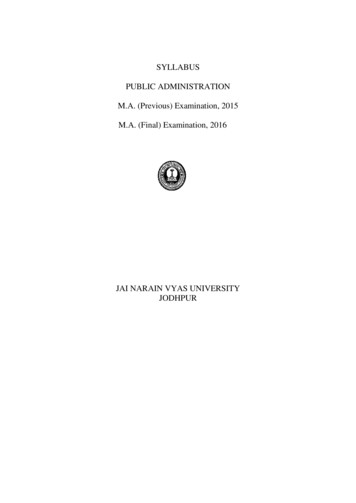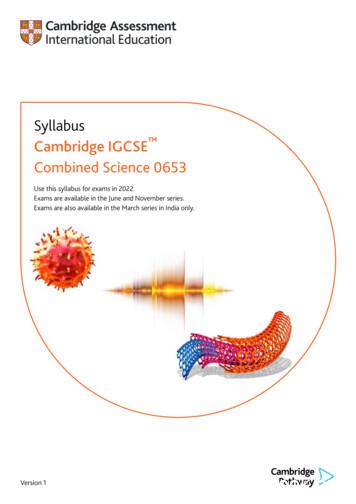SYLLABUS PUBLIC ADMINISTRATION M.A. (Previous) Examination .
SYLLABUSPUBLIC ADMINISTRATIONM.A. (Previous) Examination, 2015M.A. (Final) Examination, 2016JAI NARAIN VYAS UNIVERSITYJODHPUR
IMPORTANTWith a view to bring about greater reliability, validity and objectivity in theexamination system and also for closer integration of teaching, learning andevaluation.(i)(ii)The syllabus has been divided into units. Questions will be set from eachunit with provision for internal choice.In order to ensure that the students do not leave out the important portion ofthe syllabus, examiners shall be free to repeat the questions set in theprevious examinations.(Ref. Resolution No. 21 (c) of Academic Council dated 9.2.84)The examinees be permitted to use their personal transistorised pocket batteryoperated calculators in the examinations. The calculator to be used by the candidatesin the examinations should not have more that 12 digits, 6 functions and 2 memoriesand should be noiseless and cordless. A Calculator belonging to one candidate shallnot be allowed to be used by another candidate. The Superintendent of the centre willhave complete discretion to disallow the use of a calculator which does not confirm tothe above specification.(Ref. Resolution No. 6/90 of Academic Council dated 20th July, 1990)In Engineering and any other examinations where the use of calculators is alreadypermitted, it shall remain undisturbed.
NOTIFICATIONIn compliance of decision of the Hon’ble High Court all students are required tofulfil 75% attendance rule in each subject and there must be 75 % attendance ofthe student before he/she could be permitted to appear in the examination.REGISTRAR(Academic)
SYLLABUSPUBLIC ADMINISTRATIONM.A. (Previous) Examination, 2015M.A. (Final) Examination, 2016JAI NARAIN VYAS UNIVERSITYJODHPUR
ContentsLIST OF TEACHING STAFFGENERAL INFORMATION FOR STUDENTS .M.A. (PREVIOUS) PUBLIC ADMINISTRATIONM.A. (FINAL) PUBLIC ADMINISTRATION
DEPARTMENT OF PUBLIC ADMINISTRATIONLIST OF TEACHING STAFFS.No. Name & DesignationASSOC. PROF. & HEAD1.Dr. Jagmal Singh ShekhawatQualificationArea of SpecializationM.A.(Pol.Science Indian Administration,& Public Adm),StateandLocalPh.D.AdministrationASSTT. PROFESSOR2.Dr. Sharad ShekhawatM.A. (PublicAdm.) Ph.D.PersonnelAdministration
FACULTY OF ARTS,EDUCATION & SOCIAL SCIENCESMASTER OF ARTSGeneral Information for StudentsThe examination for the degree of Master of Arts, Education and SocialSciences shall consist of two parts : (i) The Previous Examination and (ii) TheFinal Examination.The examination will be through theory papers/practicals/viva. Pass marks forthe previous and final examinations are 36 % of the aggregate marks in all thetheory papers and viva/practicals and not less than 25% marks in the individualtheory paper viva/practicals. A candidate is required to pass in the written andthe practical/viva examinations separately.Successful candidates will be placed in the following divisions on the basis ofthe total marks obtained in previous and final examinations taken together !First division 60%, Second division 48% and Third division 36%No student will be permitted to register himself simultaneously for more thanone post-graduate course.ATTENDANCE1. For all regular candidates in the faculties of Arts, Education and SocialSciences, Science, Law, Commerce and Engineering, the minimumattendance requirement shall be that a candidate should have attended atleast 75% of the lectures delivered and tutorials held taken together aswell as 75% of practicals and sessionals from the date of his/heradmission.2. Condonation of shortage attendance:The shortage of attendance upto the limits specified below may becondoned on valid reasonsi)ii)Upto 6% in each subject plus 5 attendance in all the aggregateof subjects/papers may be condoned by the Vice-Chancellor onthe recommendation of the Dean/Director/Principal forundergraduate students and on the recommendation of the Headof the Department for the post-graduate classes.The N.C.C./N.S.S. Cadets sent out to parades and camps andsuch students who are deputed by the University to take part ingames, athletic or cultural activities may, for purpose ofattendance, be treated as present for the days of their absence inconnection with the aforesaid activities and that period shall beadded in their subjectwise attendance.
Note: 1. The attendance for supplementary students will be counted from thedate of their admission.2. In the Faculty of Engineering the attendance requirement will apply toeach semester.However, in case of practicals where examination is not held at theend of the first semester bu at the end of the second semester,attendance will be counted at the end of the second semester takinginto account attendance put in both the semesters (first and second)taken together.MEDIUMCandidate are not allowed to use any medium except Hindi or English foranswering question papers.For answering papers in the subjects of English/Hindi the medium will becorresponding language only.For answering question papers in the subject of Sanskrit the candidates areallowed to use Sanskrit, Hindi or English unless specified otherwise.
PUBLIC ADMINISTRATIONNEW EXAMINATION SCHEME(Pattern of Question Paper)PART-A (Hkkx&v)Hkkx v ds lHkh iz’u vfuok;Z gS A bu iz’uksa ds mÙkj izR;sd 30'kCnksa rd lhfer gS A izR;sd iz’u 2 vad dk gS AThe questions of Part-A are compulsory. The answer of these questionsare limited upto 30 words each. Each question carries 2 marks.PART-B (Hkkx&c)izR;sd bdkbZ esa ls ,d iz’u dk p;u djrs gq, dqy ik¡p iz’uksa dsmÙkj nhft;s A izR;sd iz’u dk mÙkj yxHkx 250 'kCnksa rd lhfer gSA izR;sd iz’u 7 vad dk gS AAttempt FIVE questions in all, selecting ONE question from each unit.The answer of each question shall be limited upto 250 words. Eachquestion carries 7 marks.PART-C (Hkkx&l)bl Hkkx ls dqy rhu iz’uksa ds mÙkj nhft;sA izR;sd iz’u dk mÙkjyxHkx 500 'kCnksa rd lhfer gSsA izR;sd iz’u 15 vad dk gS AAttempt Any THREE questions. The Answer of each question shall belimited upto 500 words.Each question carries 15 marks
PUBLIC ADMINISTRATIONM.A. (Previous) Examination, 2015There will be four papers,each of three hours duration and carrying 100 marks.Paper I : Principles of Public AdministrationPaper II : Comparative Public AdministrationPaper III: Public Personnel AdministrationPaper IV: Public Administration in IndiaM.A. (Final) Examination, 2016There will be Five papers, each of three hours duration and carrying 100 marksPaper V : Administrative ThoughtPaper VI : Financial Administration with Special Reference to India.Optional Papers: VII & VIIIAny two papers are to be offered from any one of the following groups:Group A : I : Economic Systems and AdministrationII : Social AdministrationGroup B : I : International Organisation and AdministrationII : State Administration in India with SpecialReference to RajasthanGroup C : I : Urban Local AdministrationII : Rural Local AdministrationGroup D : I : Research MethodologyII : Public PolicyPaper (IX): Indian Constitution and Administrative Institutions.
DISSERTATIONDissertation may be offered in lieu of one paper from optional group at the finalexamination. Only those candidates can offer dissertation who have secured55% marks in M.A. Previous Examination. The candidates offering dissertationshall be required to submit dissertation three weeks before M.A. FinalExamination. There will be 75 marks for written dissertation and 25 marks forViva-voce.
M.A. (Previous) Examination, 2015PAPER IPRINCIPLES OF PUBLIC ADMINISTRATIONUnit 1 : Basic Premise : Meaning, scope, nature and importance of PublicAdministration, Politics and Administration, the distinctions andsimilarities between public and private administration, New PublicAdministration. The Public Choice School; New Public ManagementPerspective.Unit 2 : Theories of Organisation: Scientific Management, The Bureaucratictheory of Organisation, Classical theory, The Human Relation theory,Behavioural Approach, Systems Approach, OrganisationalEffectiveness.Unit 3: Principles of Organisation: Formal and Informal Organisation,Hierarchy, Span of Control. Unity of Command, Authority andResponsibility, Coordination, Supervision, Centralisation andDecentralisation.Structure of Organisation: Chief Executive, Line and Staff Agencies,Department, Head Quarter and field relationship.Unit 4 : Administrative Behaviour : Decision Making, Theories of leadership,Communication, Motivation and Control.Unit 5 : Citizen and Administration : People’s Participation in Administration,Public policy process and Policy making models, Role of civil society,Right to information and Citizen’s CharterCORE BOOKSSharma, M.P.: Public Administration: Theory and PracticeWhite: Introduction to Public AdministrationBhambari, C.P.: Public AdministrationAwasthi& Mahaeshwari: Public Administration (Hindi& English)Prasad, D.R. & Others: Administrative Thinkers
ADDITIONAL READINGSFrank Marini (en.): Towards New Public AdministrationSharma, R.D.: Advanced Public AdministrationRumki Basu: Public Administration-Concept and TheoriesAlbert Lepawski: AdministrationMohit Bhattacharya: Public Administration : Structure, Process and BehaviourPAPER IICOMPARATIVE PUBLIC ADMINISTRATIONUnit 1 : Comparative Public Administration : Concept, Nature, Scope,Evolution and Significance; Features of Developed and DevelopingSocieties Administration; Approaches to the Study of ComparativePublic Administration.Unit 2 : Weber’s Typology of Authority and Administrative System withparticular reference to the Ideal Type Bureaucratic Model, Rigg’sContribution with particular reference to Prismatic Society and Salamodel, Rigg’s view on Development.Unit 3:The Concept, Scope and Significance of Development velopment,Bureaucracy and Development Administration.Unit 4:Salient features of the Administrative Systems of U.K., U.S.A. andFrance: Comparative Study of their Political Executive.Unit 5:Organisation and working of following : Treasury (UK), StateDepartment (USA), Ombundsman (Sweden), Independent RegulatoryCommissions (USA), Councial of State (France).CORE BOOKSSifflin: Towards the Comparative Study of Public AdministrationRiggs: Ecology of AdministrationArora, Ramesh K. : Comparative Public Administration (Hindi and English)Chaturvedi, T.N.: Tulnatmak Lok Prashasan
ADDITIONAL READINGSFerrinl Heady: Public Administration-A Comparative PerspectiveFred, W. Riggs : Administration in Developing Countries,Edward Weidner (ed.): Frontiers of Development AdministrationVerma, S.P. and Khanna : Comparative Public AdministrationPAPER IIIPUBLIC PERSONNEL ADMINISTRATIONUnit 1 : Public Personnel Administration : Meaning, nature and scope;Development and significance of Public Personnel Administration.Unit 2 : Basic Concepts : Administration and Policy making;professionalisation of Civil Service; Administrative Culture;Bureacracy and Environment (Political, Social and Economic),Integrity in Administration; Concept of Ethic in Public Services.Unit 3:General Characteristics of Public Personnel Administration of U.S.A.,U.K. and France, Need for Central Personnel Agencies, Organisationand Working of Central Personnel Agencies in U.S.A., U.K. andFrance.Unit 4:Recruitment and Training : Development of Merit system, Importanceof recruitment; Methods of recruitment (U.S.A., U.K. and France);Importance and types of Training Institutions U.S.A., U.K., andFrance. Training techniques; Promotion; Seniority Versus Merit.Unit 5:Salary, Service Conditions, Service Rules; Management of StaffRelations; Disciplinary Procedures, Political Rights of Civil Servants(U.S.A., U.K. and France); Management Information system forPersonnel Administration.
CORE BOOKSStahl, O. Glenn: Public Personnel AdministrationShafnitz, Jay (ed.): Personnel Management in GovernmentP.Pigors & C.A. Maynes: Personnel AdministrationGoel, S.L.: Public Personnel AdministrationSinha, V.M.: Public Personnel Administration (Hindi also)ADDITIONAL READINGSU.K Fulton Committee: The Civil ServiceVerma, S.P. & Sharma, S.K. : Managing Public Personnel System :A Comparative PerspectiveJain, C.M.: Sevavargiya PrashasanMaheshwari,S.R. The Civil Service in Great BritainJain, R.B.(ed): Aspects of Personnel AdministrationPAPER IVPUBLIC ADMINISTRATION IN INDIAUnit 1 : Evolution of Indian Administration: Kautilya, Mughal period &British Legacy. Constitutional framework: value premises of theConstitution, Parliamentary Democracy, federalism, Planning, HumanRights: National Human Rights Commission.Unit 2 : Union Government and Administration : President, Prime Minister,Council of Ministers, Cabinet Committees, Cabinet Secretariat, PrimeMinister’s Office, Central Secretariat, Mojor Ministries andDepartments.Unit 3:District Administration: Changing role of the District Collector, Lawand Order and Development Management.Local Government : Panchyati Raj and Urban Local Government,Main features of 73rd and 74th Constitutional Amendment, Major Ruraland Urban Development Programmes and their management.Unit 4:Public Services : All India Services, Central Services : Union PublicService Commission, Training in the changing context of governance.Administrative Reforms: Reforms since independence; Reports of theAdministration Reforms Commission, Problems of Implementation.
Impact of Information Technology on Public Administration, IndianAdministration and GlobalisationUnit 5:Major Issues in Indian Administration : Problems of Centre- Staterelations, Relationship between Political and Permanent Executive,Generalist and Specialist in Administration, Law and OrderAdministration, Changing nature of Indian Administration in contextof Economic Reforms; Control and accountability over IndianAdministrationCORE BOOKSMaheshwari, S.R.: Indian AdministrationJain, R.B.: Contemporary Issues in Indian AdministrationHoshiar Singh & Mohiendra Singh: Public Administration i
Sharma, R.D.: Advanced Public Administration Rumki Basu: Public Administration-Concept and Theories Albert Lepawski: Administration Mohit Bhattacharya: Public Administration : Structure, Process and Behaviour PAPER II COMPARATIVE PUBLIC ADMINISTRATION Unit 1 : Comparative Public Administration : Concept, Nature, Scope,
Rumki Basu: Public Administration. 3. Hoihiar Sir and Pradeep Sachdeva, Administrative: Theory. 4. C.P. Bhambhari : Public Administration 5. M.P. Sharma and B.L. Sadna, Public Administration in Theory and Practice. SINGHANIA UNIVERSITY Detailed Syllabus of B A (Public Administration) (Effective from session 2016-17 onward) -----B. A. 1st, 2nd & 3rd Year (Public Administration) Page 53 BPAD 102 .
Chapter 6: Public Administration in the Age of Globalization and Liberalization BOOKS FOR REFERENCE A.Avarthi and S.R.Maheswari - Public Administration Mohit Bhattacharya - Public Administration A.R,Tyagi - Public Administration C.P. Bhambri - Public Administration Dr. Rumki Basu - Public Administration
Version 1.13 P l e a s e r e a d : Creating a syllabus or overview will not affect the Canvas Syllabus or Syllabus Creator tool. However, If a syllabus is published within CreatorPro LTI, the Canvas Syllabus or Syllabus Creator tool is replaced with CreatorPro’s Syllabus and to revert the changes a SSD Support Case will need to be
Syllabus of Sixth Semester B. Pharm. 069 11. Syllabus of Seventh Semester B. Pharm. 081 12. Syllabus of Eight Semester B. Pharm. 091 B Ordianance and Rules (M. Pharm.) 101 1. Ordinance and Rules 102 2. Structure of Syllabus 107 C. Syllabus (Pharmaceutics) 115 D. Syllabus (
posts by the due date. There is no make-up for quizzes (instead, I will drop two lowest grades). For exams, make-ups will be considered only for legitimate reasons with proper documentation. THIS IS A SAMPLE SYLLABUS - Current course syllabus is available within Canvas SAMPLE Syllabus SAMPLE Syllabus SAMPLE Syllabus Syllabus
Changes to this syllabus for 2022 62 Changes to this syllabus For information about changes to this syllabus for 2022, go to page 62. The latest syllabus is version 1, published September 2019. Any textbooks endorsed to support the syllabus for examination from 2019 are still suitable for use with this syllabus.
Paper-103: Public Administration: Concepts and Ideas UNIT – 1: Evolution, Meaning, Nature and Scope of Public Administration, Public and Private Administration, Approaches to Public Administration UNIT –2: New Public Administration, New Public Management (NPM), Public Private . Maheshwari
How are you currently supporting your local tourism ADVENTURE INDUSTRY RESPONDENTS: OVERVIEW businesses concerning COVID-19? Tourism boards are primarily supporting the local industry through open communication, and by providing tools, resources and information to help members weather the crisis. % Percentage of respondents . 29 ORGANIZATIONAL CONCERNS (Tourism Boards) ATTA 2020 29. Q36 .


















